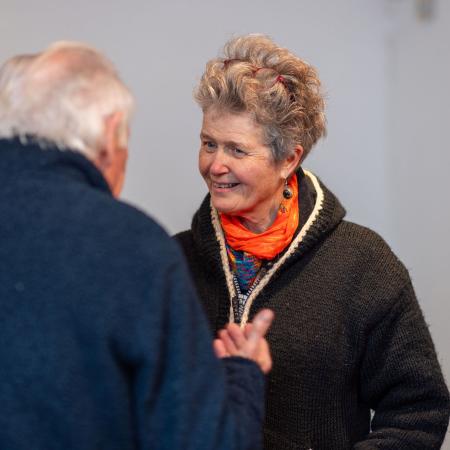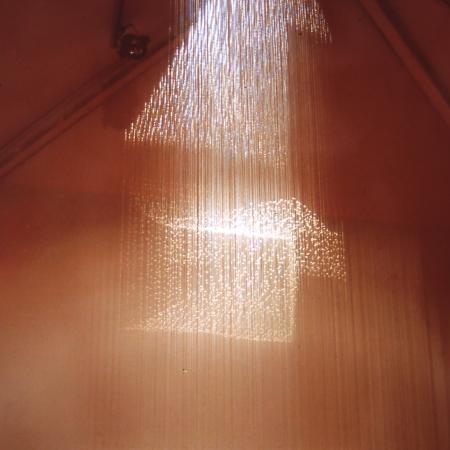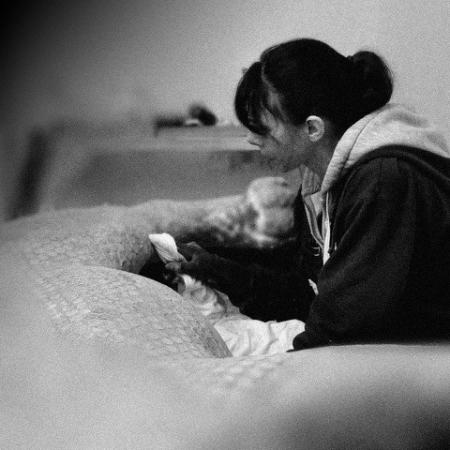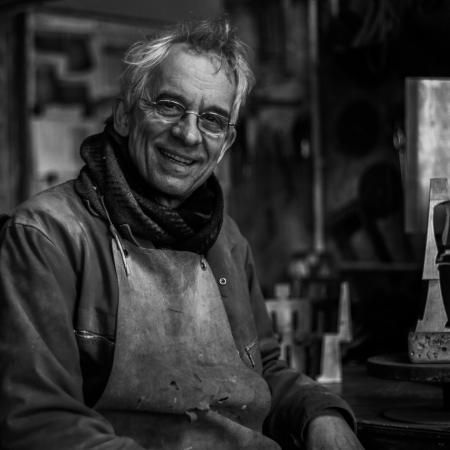Coles Castings is a fine art foundry specialising in bespoke sculptural works in
bronze, cast iron and aluminium.
The foundry grew organically out of the sculpture studios of artists Stephen Coles
and Necole Schmitz and their shared love of sculpture, metal casting and finding
solutions to sticky problems in making. They offer a full range of sculptural services
from rubber mould making through to patination. They are involved in research into
the ways artists and foundries can reduce the environmental impacts of sculpture
making. They are partnering with academic institutions here in the United Kingdom,
the United States and beyond.
Coles Castings is a Royal Society of Sculptors' Suppliers' Circle member. For more
information and to contact them go to colescastings.com
Context
One of the driving principles of Coles Castings is to reduce the environmental impact of metal casting and reduce sculpture making’s dependency on fossil fuels.
To help realise this goal, Coles Castings has developed crucible furnaces which utilise recycled vegetable oil for fuel. The standard fuel for crucible furnaces is propane, which whilst useful is a fossil fuel and has the limitation of being unable to reach temperatures hot enough to melt metals such as iron. Iron is commonly cast using coke fired cupola furnaces or electro arc induction furnaces.
As both Schmitz and Coles use cast iron in their sculptural practices, there was always a desire to be able to access this material more readily both for themselves and to be able to offer it to their clients. Additionally, because this technology melts the metal in a crucible, the metallurgy and smelting of alloys is more controllable, preventing miscasts, which in turn cuts down on the environmental impact of casting.
Because of iron’s high melting point, ordinary crucible furnaces are not able to reach the temperatures needed, and thus iron must be melted using a coke-fired cupola furnace. Coke is a fuel made by roasting coal to drive off impurities and convert the coal to pure carbon. The burning of this pure carbon fuel did not sit well with the ethos of Schmitz and Coles’ practices and indeed with the artists that they work with.
To find a solution to this conundrum, they began research creating a waste oil-fired furnace for melting cast iron. They were looking for a design that was reliable, easy to use and could handle the viscosity and variability of recycled waste vegetable oil. To meet Coles Castings’ goal of reducing the use of virgin fossil fuels the burners needed to be compatible with reclaimed vegetable oil. However, available burners run on fuels such as diesel or kerosene and could not handle the oil reclaimed from the waste streams of local pubs and chip shops.
Through a series of trial and error, redesign, and innovation, they were able to develop a waste oil burner that could reliably reach the temperatures required to melt iron using waste vegetable oil. What’s more, the fuel efficiency and speed of the melt also meant that Coles Castings had developed a burner that improved the melting practice for the other metals regularly used for their clients such as bronze and aluminium.
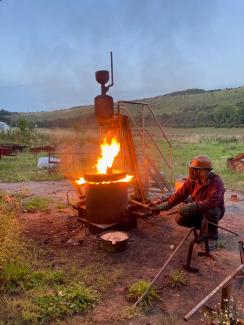
They hope that beyond their own practice, this technology will allow the continuation of foundry work at educational institutions, microbusinesses, and makers who cannot support the infrastructure necessary to use electric arc induction furnaces (which can be a more sustainable option if the electricity used comes from renewables).
Because this technology has been so transformational in their sculptural practice, they are interested in disseminating this technology to a wider community of makers and small foundries. They hope it will allow these groups to continue casting metal in a more sustainable way, both environmentally and economically.
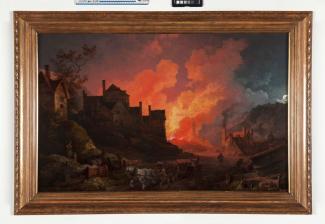
Bringing Waste Oil Furnaces to the Wider Artist Community
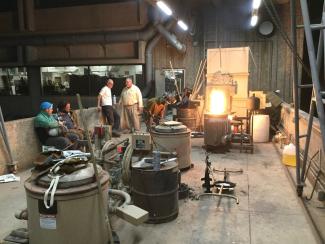
Schmitz and Coles research around waste oil furnaces has been recognised by artists and institutions across the UK, Europe and the United States. In 2022 Coles Castings was invited to demonstrate their furnace at the 9th International Conference on Contemporary Cast Iron Art in Berlin. The ability to reliably cast iron without the use of a cupola furnace and without the use of fossil fuels piqued the interest of several delegates at the conference. Including academic and artist, Professor Mary Neubauer of Arizona State University (ASU).
The following Autumn Stephen Coles of Coles Castings returned to ASU as a visiting artist. The purpose of the trip was to offer a more sustainable method of melting cast iron within the sculpture department, by converting one of the university’s propane gas furnaces to run on waste soybean oil. Coles’ project would allow students and academics to access cast iron as a sculptural material on a regular basis without the need to wait for the annual iron pours.
The project was recognized by Arizona State University and shortlisted for their 2024 President’s Award for Sustainability. It was featured in an artist’s interview for the Cast Iron podcast https://www.youtube.com/watch?v=faPgIS_sE1s and also featured in an article in the Investment Casting Insitute’s InCast magazine followed by a panel at the Investment Casting Institute’s 71st Technical conference in Milwaukee the following Autumn.
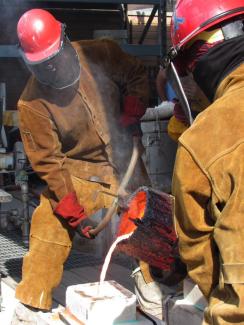
Coles Castings was also showcased at the Western Cast Iron Art 8th Biennial conference in El Cajon, California in November 2024 and Coles Castings will be presenting a paper at the National Conference on Contemporary Cast Iron Art and Practices, at Sloss Furnaces in Birmingham, Alabama in April 2025. Significantly, Coles Castings’ waste vegetable oil furnace will be the first non-cupola furnace to be used as an artists’ production furnace in the history of the event. For more information or to attend visit: https://www.nccciap.com
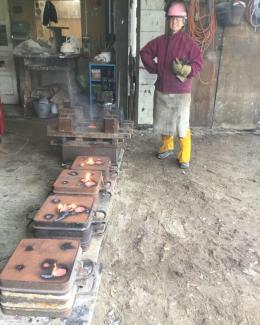
Following on from these plaudits, other institutions both in the UK and in America have expressed an interest in converting their foundry facilities to use waste vegetable oil. One of these institutions looking to be able to reliably offer iron as a material and to minimize the environmental impact of all their metal casting is the Edinburgh Sculpture Workshop (ESW). Stephen Murray visited from Scotland along with several other artists looking to cast their sculptures with Coles Castings and see their waste vegetable oil furnaces in action.
At their annual open house affectionately termed the ‘Melbury Meltdown’ held every July, Coles Castings invites artists, academics and foundry professionals to Coles Castings to descend on the workshop to realise projects and make connections with like-minded makers all in the bucolic setting of the Dorset countryside.
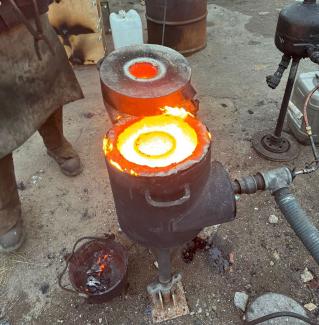
After a successful weekend of casting bronze, iron and aluminium the delegates returned with their work to be exhibited in Scotland, Wales and London. Murray described the event to ESW’s artist members and board who will be collaborating with Coles Castings to build their own waste oil furnace for their workshop in Edinburgh. https://edinburghsculpture.org/whats-on/melbury-meltdown-coles-casting-dorset-july-2024/
Stephen Coles will be working with Murray in February to build the new furnace, with a symposium celebrating their freedom from fossil fuels to coincide with the Edinburgh Fringe this August. If you are interested in attending, please get in touch with ESW or Coles Castings.
It is incredibly satisfying for the Coles Castings’ team to see that this technology and method of casting is starting to gain traction in the broader artist community. “We are delighted to be given the opportunity to share our enthusiasm and expertise of all things sculptural with the Royal Society and its members. We would love to hear about your projects and to help realise them.”- Stephen Coles
If you are interested in learning more about their research or have a project you would like produced at Coles Castings, please do get in touch via info@colescastings.com
